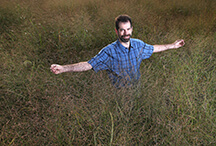March 24, 2016
Science On Tap to discuss utilization of carbon atoms by way of unorthodox energy extraction
 |
|
Nathan Mosier |
WEST LAFAYETTE, Ind. - Nathan Mosier, a professor from the Department of Agricultural and Biological Engineering at Purdue University, will headline next week's Science on Tap with a discussion on innovative technologies and how they are being used to extract energy from places as unlikely as your garbage bin or a pile of leaves.
The March Science on Tap, titled "Reduce, Reuse, Recycle, Refuel: No Carbon Left Behind," is at 6 p.m. Thursday (March 31) in the upstairs of Lafayette Brewing Company, 622 Main St., Lafayette. The informal lecture is free and open to those 21 and older.
The talk is sponsored by the Department of Agriculture and Biological Engineering, the colleges of Agriculture and Engineering, and Discovery Park.
Mosier will discuss research and technology development that his team has conducted at the intersection of materials and fuels. He also will talk about a project that took these technologies to the unlikely location of the Iraqi desert in 2008, where the lessons learned are still being applied to new research and new technologies today.
"The guiding principle has been to make the most use of every carbon atom that plants have reduced through photosynthesis for making fuels and materials before those carbon atoms return to the atmosphere as carbon dioxide," Mosier said.
To accomplish this, novel applications of chemistry, biology and engineering are needed to develop the know-how and the technologies to make and break chemical bonds and extract energy from unexpected places, he said.
Efforts to reduce, reuse and recycle have had significant impacts on lowering the carbon footprint of material use in modern society, Mosier said. Additional efforts to develop low-carbon fuels and low/no carbon power have had impacts on the carbon footprint of our energy use.
Mosier has 15 years of experience in research related to biofuels and bioprocessing technology. He is the author or co-author of more than 60 journal publications, seven book chapters, co-author of a textbook and has been the inventor on seven awarded U.S. and international patents.
His research addresses fundamental topics in bioprocessing with current projects in enzyme mimicking catalysts for transforming renewable resources to fuels and chemicals, cellulose pretreatment for biofuel and biochemical production, thermochemical conversion of cellulosics to fuels and value-added chemicals and bioprocess simulation.
Science on Tap, led by graduate students Nelda Vazquez, Andrew Hesselbrock and Paula Cooper, provides Purdue faculty and collaborating researchers the opportunity to share research activities in an informal setting with presentations that are designed to appeal to a more general audience. Attendance at the monthly event has averaged 80 during the program's first four years.
Writers: Emily Sigg, 765-494-4719, esigg@purdue.edu
Phillip Fiorini, 765-496-3133, pfiorini@purdue.edu
Sources: Nathan Mosier, 765-494-7022, mosiern@purdue.edu
Nelda Vazquez, 765-496-1487, nvazque@purdue.edu
Andrew Hesselbrock, ahesselb@purdue.edu
Paula Cooper, porourk@purdue.edu

